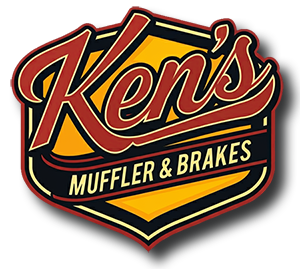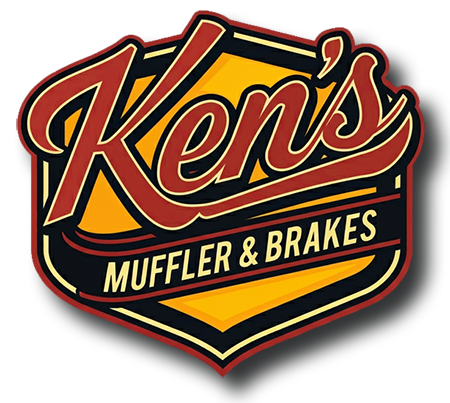3537 W Northwest Hwy. Dallas, TX 75220
Monday - Friday 7:30am - 5pm | Saturday 9am - 3pm
Ken’s Muffler & Brakes Blog

We invite you to monitor our News Blog for informative articles.

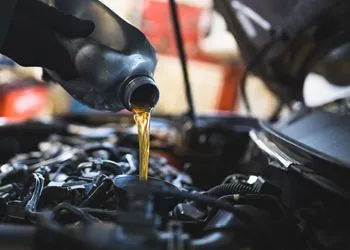
by Ken’s Muffler & Brakes
•
9 April 2025
Keeping up with regular oil changes is one of the simplest yet most important things you can do to protect your vehicle’s engine. While it’s easy to put off this maintenance task, sticking to your oil change schedule can save you money and hassle in the long run. At Ken’s Muffler & Brakes, we provide full-service oil changes in the greater Dallas area. Here are four reasons why you should always follow your recommended oil change intervals. Keeps Your Engine Properly Lubricated Motor oil plays a critical role in keeping all the moving parts of your engine properly lubricated. Without sufficient lubrication, metal components will grind against each other, causing excessive friction and wear. Over time, this can lead to serious engine damage, which may require costly repairs. Fresh oil helps ensure smooth engine operation and prevents premature wear and tear. Helps Prevent Engine Overheating Oil doesn’t just lubricate your engine—it also helps regulate its temperature. As it circulates, oil absorbs heat and carries it away from critical components. However, over time, old oil loses its ability to cool the engine effectively. Dirty or degraded oil can lead to overheating, which increases the risk of engine failure. Regular oil changes help keep your engine running at the optimal temperature. Improves Fuel-Efficiency Old, dirty oil forces your engine to work harder, which can reduce fuel-efficiency. A well-lubricated engine operates more smoothly, requiring less fuel to function properly. If you want to get the most miles per gallon out of your vehicle, sticking to your oil change schedule is a simple way to improve fuel economy and save money at the pump. Extends the Life of Your Engine Your engine is the heart of your vehicle, and taking care of it can significantly extend the life of your car. Regular oil changes reduce the risk of major engine problems by preventing excessive wear and keeping internal components in good condition. By following your manufacturer’s recommended oil change schedule, you help ensure that your engine lasts for many miles to come. Full-Service Oil Change in Dallas, TX For auto maintenance in Dallas and the surrounding area, contact Ken’s Muffler & Brakes at 214-308-2320 . Feel free to give us a call to make an appointment!

by Ken’s Muffler & Brakes
•
11 March 2025
Your vehicle’s alternator is responsible for keeping the battery charged and powering essential electrical components while the engine is running. When the alternator begins to fail, it can cause a range of problems. At Ken’s Muffler & Brakes, we provide expert alternator replacement and auto electric repair in the greater Dallas area. Here are five common signs that your alternator may be failing and in need of replacement. Battery Warning Light on the Dashboard Modern vehicles commonly have a battery warning light that illuminates when there’s an issue with the charging system. While this light is often mistaken for a simple battery problem, it can also indicate that the alternator is not generating enough power. If you see this warning, it’s best to have your charging system checked before your vehicle loses power completely. Dimming/Flickering Lights A frequent sign of alternator trouble is dim or flickering headlights, dashboard lights, or interior lights. Since the alternator supplies power to the vehicle’s electrical system, a weakening alternator may struggle to maintain consistent voltage. If multiple lights in your vehicle are acting erratically, it’s a strong indication that the alternator isn’t providing a steady electrical supply. Electrical Accessories Malfunctioning A failing alternator can lead to erratic behavior in your car’s electrical accessories. Power windows may operate slower than usual, the radio may cut in and out, or the air conditioning may not blow as strongly as before. If you experience multiple electrical issues at the same time, the alternator may be struggling to provide enough power to all systems. Dead Battery or Difficulty Starting If your car’s battery dies, it could be due to a failing alternator rather than the battery itself. When the alternator stops charging properly, the battery is forced to supply all of the power, which drains it quickly. Jump-starting the battery may temporarily resolve the issue, but if the alternator isn’t charging the battery, the problem will return. Testing both the battery and alternator can help determine the root cause. Strange Noises Coming from the Engine Unusual noises, such as grinding or whining, can indicate that the alternator’s internal components are wearing out. Ignoring these sounds can lead to complete alternator failure, leaving you stranded with a non-starting vehicle. Alternator Replacement & Auto Electric Repair in Dallas, TX For auto repair in Dallas and the surrounding area, contact Ken’s Muffler & Brakes at 214-308-2320 . Feel free to give us a call to schedule an appointment!
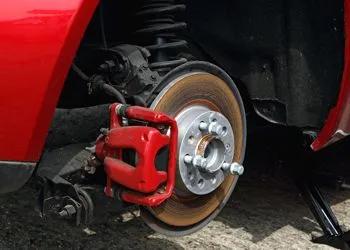
by Ken’s Muffler & Brakes
•
8 February 2025
When your brakes start to fail, it can put you, your passengers, and other drivers at risk. Recognizing the early signs of brake trouble can help you address problems before they become dangerous. At Ken’s Muffler & Brakes, we provide expert brake repair in the greater Dallas area. Here are five common warning signs of brake trouble. Squeaking or Grinding Noises Unusual noises when you apply the brakes are often the first sign of a problem. A high-pitched squeaking sound typically indicates that the brake pads have worn down and need to be replaced. If you hear a grinding noise, it could mean that the brake pads are completely worn out, causing metal-on-metal contact. Ignoring these sounds can lead to more severe damage to your rotors, which can be costly to repair. Soft Brake Pedal If your brake pedal feels unusually soft or spongy when you press it, this is a clear indication of brake trouble. A properly functioning brake pedal should feel firm and responsive. A soft pedal could mean there’s air in the brake lines. This could also be a sign of low brake fluid, perhaps due to a leak. If your car is leaking brake fluid, you’ve got a serious safety hazard, and should get towed to the shop instead of driving there. Vibrations When Braking If you notice vibrations when you apply the brakes, it could be a sign of warped brake rotors. Rotors can become uneven due to excessive heat and wear, reducing the efficiency of your braking system. If you notice shaking or pulsating when stopping, have your brakes inspected as soon as possible. Car Pulling to One Side When you press the brakes, your car should stop in a straight line. If your vehicle pulls to one side, it may indicate a stuck caliper, potentially because of corrosion. This can make it much harder to control your vehicle, so it’s crucial to have your brakes checked and repaired promptly. Brake Warning Light If your brake warning light comes on, it’s a direct signal that something is wrong with your braking system. The light could indicate issues such as low brake fluid or faulty wheel speed sensors. Even if your brakes seem to be functioning normally, don’t ignore this warning. Have the mechanic diagnose and address the issue to ensure your brakes are working safely. Brake Repair in Dallas, TX For auto repair in Dallas and the surrounding area, contact Ken’s Muffler & Brakes at 214-308-2320 . Feel free to give us a call to make an appointment!
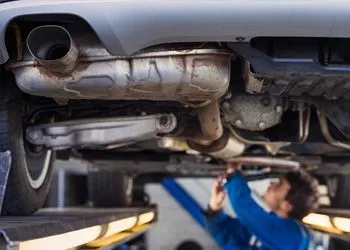
by Ken’s Muffler & Brakes
•
11 January 2025
The catalytic converter is an important component of your vehicle’s exhaust system, responsible for reducing harmful emissions and enabling proper engine performance. When it begins to fail, your vehicle’s efficiency and environmental impact are at risk. Recognizing the warning signs of a catalytic converter problem can help you address the issue before it leads to more severe trouble. At Ken’s Muffler & Brakes, we provide expert catalytic converter replacement in the greater Dallas area. Here’s a look at four symptoms of a catalytic converter problem. Reduced Engine Performance One of the first signs of a failing catalytic converter is a noticeable drop in engine performance. You may experience sluggish acceleration, reduced power, or difficulty climbing hills. This occurs because a clogged catalytic converter restricts exhaust flow, making it harder for your engine to function efficiently. Decreased Fuel-Efficiency A faulty catalytic converter can cause your vehicle to burn more fuel than usual. This happens because the engine has to work harder to push exhaust gases through the clogged or damaged converter. If you notice a significant drop in gas mileage, it’s worth having your catalytic converter inspected as part of the diagnosis. Check Engine Light Illumination The check engine light is often triggered when there’s an issue with the catalytic converter. Modern vehicles are equipped with oxygen sensors that monitor the efficiency of the converter. If the sensors detect abnormal readings, they will activate the check engine light. A diagnostic scan can confirm whether the catalytic converter is the source of the problem. Rotten Egg Smell from the Exhaust A common indicator of a catalytic converter problem is a strong sulfur or “rotten egg” smell coming from the exhaust. This odor is caused when the converter is no longer able to effectively neutralize hydrogen sulfide. If you detect this smell, it’s a sign that your catalytic converter may be failing and needs immediate attention. Catalytic Converter Replacement in Dallas, TX For catalytic converter replacement in Dallas and the surrounding area, contact Ken’s Muffler & Brakes at 214-308-2320 . Feel free to give us a call to schedule an appointment for car care in Dallas!

by Ken’s Muffler & Brakes
•
6 December 2024
Healthy shocks play a crucial role in ensuring a smooth and stable ride. They absorb bumps and vibrations from the road, maintaining proper handling and safety. But as they age, shocks can wear out, leading to compromised performance and potentially unsafe driving conditions. At Ken’s Muffler & Brakes, we provide expert shock replacement in the greater Dallas area. Here are five signs that it’s time to replace your vehicle’s shocks. Excessive Bouncing After Hitting a Bump When your shocks are in good condition, they prevent your car from bouncing excessively after hitting a bump or pothole. If your car continues to bounce several times after an impact, it’s a sign that your shocks are worn out. This excessive movement reduces your ability to control the vehicle, especially on uneven roads. Longer Braking Distances Worn shocks can affect your vehicle's stopping power. When the shocks fail to properly stabilize the vehicle during braking, your car may take longer to come to a stop. This can consequently increase the risk of accidents, particularly in emergency situations. Uneven Tire Wear Shocks help maintain consistent tire contact with the road. If they are no longer effective, your tires may experience uneven wear patterns. Inspect your tires for irregular tread wear—it could indicate that your shocks aren’t distributing weight evenly across the wheels. Noticeable Fluid Leaks Shocks contain hydraulic fluid that helps absorb road impacts. If you see oil leaking from your shocks or struts, it means they need attention from the mechanic. This fluid loss will reduce their effectiveness and should be addressed promptly to prevent further problems. Decreased Handling and Stability If your vehicle feels unstable while cornering or sways excessively when turning, your shocks may no longer be providing adequate support. This instability can make driving more dangerous, especially at high speeds. Replacing the shocks can restore your vehicle’s handling and improve overall safety. Suspension Repair in Dallas, TX For auto repair in Dallas and the surrounding area, contact Ken’s Muffler & Brakes at 214-308-2320 . Feel free to give us a call to make an appointment!
Estimate Request
Please fill in the form below and we'll have a representative contact you.
Thank you for contacting us.
We will get back to you as soon as possible.
We will get back to you as soon as possible.
Oops, there was an error sending your message.
Please try again later.
Please try again later.
Since 1969, locally owned and operated Ken’s Muffler & Brakes has been providing expert auto repair in Dallas for all makes and models of vehicles.
3537 W Northwest Hwy. Dallas, TX 75220
Monday - Friday 7:30am - 5pm | Saturday 9am - 3pm
© 2025
All Rights Reserved
